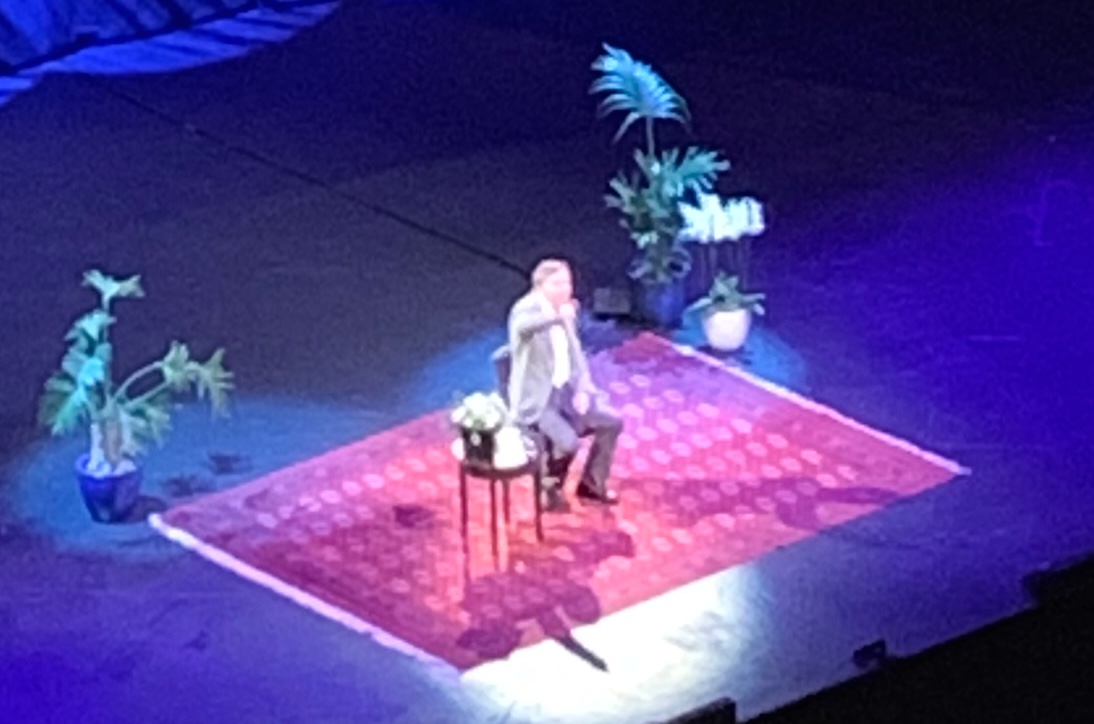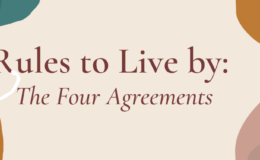The primary cause of unhappiness is never the situation, but your thoughts about it. Be aware of the thoughts you are thinking.
-Eckhart Tolle, A New Earth: Awakening to Your Life’s Purpose
It’s not often spiritual leader Eckhart Tolle turns up for a talk in London. When I found out about it, the show was sold out. Determined to attend, I checked back every day on the off chance that more would be released. I was rewarded during the second week with a standing only ticket up in the gallery of the Royal Albert Hall.
The four-hour ‘Awakening Consciousness’ event began at 5:30 on a stormy evening. Dark clouds had been accumulating and circulating around London throughout the afternoon. Any doubt of his connection to universal consciousness was released during the opening minutes when a massive thunder and lightning collided causing vibrations to ripple through the hall just as he just shared that, “the deeper dimension of consciousness is the greatest thing that can happen in your life.” Even in the warm, dry shelter of the grand scarlet painted hall, we were powerfully and dramatically reminded of the presence of Mother Nature.
Eckhart Tolle sits simply at the center of the stage in an armchair, no reference notes, and just speaks as if a stream of enlightened consciousness is emanating through him. The sell-out crowd comes to a hush taking in and contemplating every word. He speaks slowly and pauses frequently allowing space to consider the deeper meaning of what he is saying. He portrays the idea of a space existing between words and between thoughts and forces us, the audience, to sit in the discomfort of that space on more than one occasion.
While he is serious about his purpose to lead others to a higher consciousness, he maintains a balance of wisdom and humor throughout the evening. For example, he recalled having attended a performance at the Royal Albert Hall when he was younger living in London. He mused that those seats way up in the hall and in the gallery provide a much greater perspective of the space. A laugh erupted from the crowd while those of us in the proverbial cheap seats (…if only there had actually been seats!) considered the alternate perspective of our physical location during the program. Even the humorous moments carried the thread of consciousness.
Always returning to the necessity to be and to live in the present moment, he conveys a message of universal spiritual themes such as the ego, compulsive behavior, and sources of unhappiness, enhancing the lessons with references and stories coming from Judaism, Christianity, Buddhism, mythology, Hindu philosophy, and ancient scholars. Maintaining consistency with his books, The Power of Now, and A New Earth: Awakening to your life’s purpose, the message spiraled through broad subjects in an attempt to provide a tangible explanation for something as intangible as consciousness.
“If you are trapped in a conditioned energy field you are condemned to perpetual dissatisfaction.”
Much attention focused on what he calls the “conditioned mind” and the “collective conditioned mind”. This is related to one’s dependence on external factors to achieve life satisfaction, and extends to the degree to defining one’s own identity by external markers. This can be anything from social status to material possessions to career achievements and the like. He suggests that what we have come to define as “the problems of our lives” exist in the mind and we become imprisoned by them. The real problem, he explains, is that we have become too attached to the thoughts and are conditioned to believe that those thoughts are the truth. The goal is to separate the thoughts and conditioned ideas from the reality of the present moment. The result will be a greater sense of ease in life by detaching from the thoughts and opinions that have been weighing us down.
“The situation did not create the unhappiness, it was the narrative about the situation that triggered you, put you in a state of reaction and at the mercy of the external situation.”
As he develops this theme, he uses the example of rain to clarify. Modern weather forecasting and conversations about the weather have led many of us to be conditioned to have an opinion about the rain, which will often be negative. Words like dreary, icky, dreadful, miserable, awful, grim, lousy, and so on are used to describe rainy days. Here in London when reading the Evening Standard distributed free to commuters as they head home after work, the weather forecast includes icons. A tidy pile of poop is the icon for a rainy day. But what if we take away all the judgment and conditioning about the rain? Then, it’s just rain. Ultimately, rain is as important to life as sun. The real problem is that we are carrying around preconceived notions about nearly everything we encounter and experience as we go about each day. One’s mind has been conditioned based on individual experiences, family situations, cultural, gender, and generational customs. These greater forces are considered extensions of the mind and also of what Eckhart Tolle calls, “the collective mind”. He warns to be careful with devices because they are an extension of the mind and have very addictive potential. We will become more conscious when we are able to recognize how our thoughts interact and interfere with the reality of the present moment.
During the midway point of the evening, we are all led through a thirty minute meditation by Eckhart Tolle’s partner Kim Eng. Already silent, we become still as we are instructed to close our eyes and focus on the breathing. As we enter deeper in to the meditation, we focus on various parts of the body while maintaining connection to the breath. Minute by minute there is a detachment from the mind. When the experience is complete, I am stunned that the time has already passed. I even check my watch to confirm that it had really been half an hour. I feel relaxed and peaceful with a shift in the perception of time. Following a brief intermission and Eckhart Tolle returned for the final segment.
“Become aligned with the present moment because that’s all you even have.”
Present moment practice involves perceiving the world around you without labeling the world around you. Just allowing things to be. Once there is a thought or a judgment it is very likely to attach to the ego where it will proceed on a tumultuous journey of the need to satisfy the appetite of the ego. He illustrates that Narcissus fell in love with himself and became very unhappy. The ego needs to feel superior. In this sense, any situation and thoughts about that situation create the potential to become possessed with a sense of victim identity. This is incredibly toxic and will only lead to discontentment. Through awareness, one is able to transform worry, irritation, aggravation, anxiety, judgment, misery, and all this mental commentary to peace.
“Essence identity is not something you need to get, it just is.”
Eckhart Tolle discusses the “Deep I am”. Through meditation and awakening one discovers that consciousness is not something that you can “find” because is it already there. He describes most our lives as the ripple of a wave at the surface of the ocean that is reacting to its environment. That ripple is connected and one with the depths of the ocean and by going deeper there is stillness and peace. Babies and very young children are examples to us. A one-year old is simply aware and taking it all in. We all have the potential to connect to source energy and connect to the essence of self.
With his closing words, he thanks the crowd, stands briefly, and leaves the stage. As I make my way home on the dark, rainy night, I notice that yes, it’s raining, and really it’s just that, the state of the present moment.







